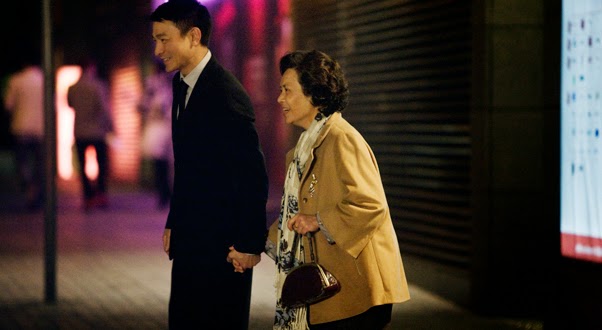A
Simple Life
A
film by Ann Hui
2011
/ Hong Kong / 118 mins
5.45
pm /11th Jan 2015
Perks
Mini Theater
http://konangalfilmsociety.blogspot.in/
"A Simple Life" paints portraits of two good
people in gentle humanist terms. Here is a film with the clarity of fresh
stream water, flowing without turmoil to shared destiny. No plot gimmicks. No
twists and turns. Just a simple life.
The life is that of Ah Tao, who was orphaned during the
Japanese occupation of Hong Kong, spent her entire life in the service of four
generations of a Chinese family, and is now the servant of the only family
member still living in China. He is Roger, a movie producer. They have a
settled routine. Ah Tao suffers a stroke, and Roger takes charge of her care.
She doesn't complain. Throughout the film, she resists
his money, protests that his presents cost too much, tells him to spend more
time at his job and less on his visits to her. This despite the fact that she
literally has no one else in her life (all the members of Roger's family now
live in America).
We see that although they have never articulated it, they
have become dependent on each other. She raised him from infancy. When we meet
his mother, she seems perfectly nice, but there isn't the same unspoken bond. Neither
Ah Tao nor Roger is demonstrative; But they care. The movie has an emotional
payoff; It expresses hope in human nature.
(Excerpts from Roger Ebert’s review )
Ann
Hui
One of the most important figures of Hong Kong cinema,
Ann Hui was born in Manchuria in 1947 and moved to Hong Kong when she was five
years old. She studied English language and literature and comparative literary
studies until 1972, then spent two years at the London Film School. Upon
returning to Hong Kong, Hui became an assistant to the veteran director King Hu
and then joined TVB, where she directed serials and documentaries on 16 mm. In
1977, she joined the ICAC (Independent Commission for Anti-Corruption) and made
seven TV episodes for its drama series, two of which were banned from airing
because of the sensitive subject matter. She then joined the government TV
network RTHK in 1978 and made three featurettes for the series Below the Lion
Rock, The other two films were Huyue de Gushi (The Story of Wu Viet) (1981),
which was screened at the Director's Fortnight of the Cannes Film Festival, and
Tuo Pen Hu Hai (The Boat People) (1982), an Official Selection at Cannes and
Best Film at the Hong Kong Film Awards.
Hui left television and made her first feature film, Feng
Jie (The Secret), in 1979. Zhuang Dao Zheng (The Spooky Bunch, 1980) was her
venture into a popular genre in Chinese literature and film, the ghost story.
Quing Cheng Zhi Lian. Ke Tu Chin Hen
(Song of the Exile) (1990), which is somewhat autobiographical, won the Best
Film prize both at the Asian Pacific Film Festival and Rimini Film Festival.
Hui executive producedYim Ho's The Day the Sun Turned Cold (1994), Best Film at
the Tokyo International Film Festival.






No comments:
Post a Comment